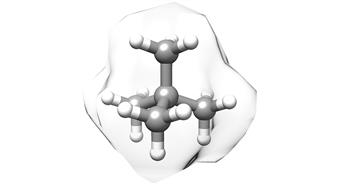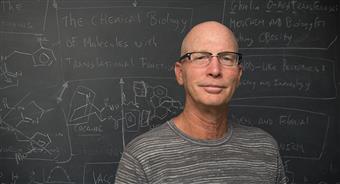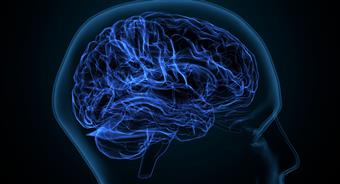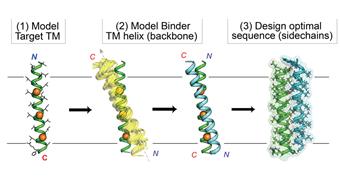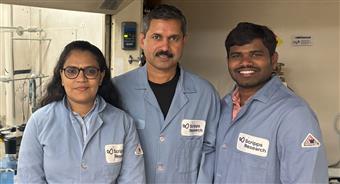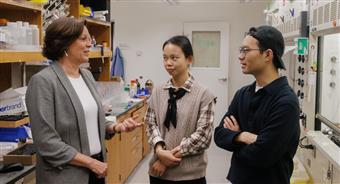
Flu mutation study suggests universal flu vaccine may be even more challenging than expected Many flu strains may be capable of mutating to escape universal-vaccine antibodies.
June 23, 2020
LA JOLLA, CA Some common strains of influenza have the potential to mutate to evade broad-acting antibodies that could be elicited by a universal flu vaccine, according to a study led by scientists at Scripps Research. The findings highlight the challenges involved in designing such a vaccine, and should be useful in guiding its development.
In the study, published in Science, the researchers found evidence that one of the most common flu subtypes, H3N2, can mutate relatively easily to escape two antibodies that were thought to block nearly all flu strains. Conversely, they found it is much more difficult for another common subtype, H1N1, to escape from the same broadly neutralizing antibodies.
One of the main goals of current influenza research is to develop a universal vaccine that induces broadly neutralizing antibodies, also known as bnAbs, to give people long-term protection from the flu.
These results show that in designing a universal flu vaccine or a universal flu treatment using bnAbs, we need to figure out how to make it more difficult for the virus to escape via resistance mutations, says the study's senior author Ian Wilson, DPhil, Hansen Professor of Structural Biology and Chair of the Department of Integrative Structural and Computational Biology at Scripps Research.
The promise of a universal vaccine
Influenza causes millions of cases of illness around the world every year and at least several hundred thousand fatalities. Flu viruses have long posed a challenge for vaccine designers because they can mutate rapidly and vary considerably from strain to strain.
The mix of strains circulating in the population tends to change every flu season, and existing flu vaccines can induce immunity against only a narrow range of recently circulating strains. Thus, current vaccines provide only partial and temporary, season-by-season protection.
Nevertheless, scientists have been working toward developing a universal flu vaccine that could provide long-term protection by inducing an immune response that includes bnAbs. Over the past decade, several research groups, including Wilson's, have discovered these multi-strain neutralizing antibodies in recovering flu patients, and have analyzed their properties. But to what extent circulating flu viruses can simply mutate to escape these bnAbs has not been fully explored.
In the study, first-authored by postdoctoral research associate Nicholas Wu, PhD, and staff scientist Andrew Thompson, PhD, the team examined whether an H3N2 flu virus could escape neutralization by two of the more promising flu bnAbs that have been discovered so far.
Known as CR9114 and FI6v3, these antibodies bind to a critical region on the virus structure called the hemagglutinin stem, which doesn't vary much from strain to strain. Because of their broad activity against different flu strains, they've been envisioned as antibodies that a universal flu vaccine should be designed to elicit, and also as ingredients in a future therapy to treat serious flu infections.
Using genetic mutations to methodically alter one amino acid building-block of the protein after another at the stem site where the bnAbs bind, Wu and colleagues found many single and double mutations that can allow H3N2 flu to escape the antibodies' infection-blocking effect.
The team also found a few instances of these resistance mutations in a database of gene sequences from circulating flu strains, suggesting that the mutations already happen occasionally in a small subset of ordinary flu viruses.
Escape skills vary by flu strain
Although experiments and analyses suggested that H3N2 viruses are broadly capable of developing resistance mutations, the same was not true for H1N1 viruses. The researchers tested several H1N1 viruses and found that none seemed able to mutate and escape, except for rare mutations with weak escape effects. The H3N2 and H1N1 subtypes account for most of the flu strains circulating in humans.
The researchers used structural biology techniques to show how differences in the hemagglutinin stem structure allow H3N2 flu viruses to develop resistance mutations to the two stem-binding antibodies more easily than H1N1 viruses.
If it's relatively easy for H3N2 to escape those bnAbs, which are the prototype antibodies that a universal flu vaccine should induce, then we probably need to think more carefully and rigorously about the design of that universal flu vaccine against certain influenza subtypes, Wu says. The good news is that a universal flu vaccine should at least work well against the H1N1 subtype.
The researchers now plan to conduct similar studies with other flu subtypes and bnAbs. They say that in principle, a vaccine eliciting multiple bnAbs that attack different sites on flu viruses or are more accommodating to changes in the virus could help mitigate the problem of resistance mutations.
Different genetic barriers for resistance to HA stem antibodies in influenza H3 and H1 viruses was authored by Nicholas Wu, Andrew Thompson, Juhye Lee, Wen Su, Britni Arlian, Jia Xie, Richard Lerner, Hui-Ling Yen, Jesse Bloom, and Ian Wilson.
Support for the research was provided by the Bill and Melinda Gates Foundation (OPP1170236), and the National Institutes of Health (K99 AI139445, F30 AI136326, R01 AI127893, R56 AI127371, R01 AI114730).
Infectious Diseases Immunology & Microbiology Wilson, Ian
More from Scripps
20/04/2024
New copper-catalyzed C-H activation strategy from Scripps Research Two-mode reactions inspired by human detox enzymes offer powerful new tools for drug discover...
12/04/2024
Scripps Research chemists devise easier new method for making a common type of building block for drugs Scientists transform simple linear amines into saturated...
06/04/2024
A simple, inexpensive way to make carbon atoms bind together A Scripps Research team uncovers a cost-effective method for producing quaternary carbon molecules,...
04/04/2024
Developing a vaccine for the zombie drug xylazine Scripps Research chemical biologists design an early proof-of-concept vaccine that could lead to the first...
30/03/2024
How blocking a neural receptor responsible for addiction could reduce alcohol use A Scripps Research team found that a new therapeutic that targets the kappa op...
13/03/2024
New computational strategy boosts the ability of drug designers to target proteins inside the membrane Customized-design approach could streamline the design of...
29/02/2024
Scripps Research scientists reveal how first cells could have formed on Earth New phospholipid discovery brings researchers closer to understanding how primordi...
29/02/2024
How molecular handedness emerged in early biology Scripps Research chemists fill a major gap in origin-of-life theories.
February 28, 2024
LA JOLLA, CA Mole...
22/02/2024
Snaking toward a universal antivenom Scripps Research scientists discovered antibodies that protect against a host of lethal snake venoms.
February 21, 2024
...
06/02/2024
Calibr-Skaggs announces expansion of option and license agreement with AbbVie to develop novel cell therapies for solid tumors and autoimmune diseases
AbbVie...
26/01/2024
Re-energizing mitochondria to treat Alzheimer's disease Scripps Research team restored neuron-to-neuron connections in human cells.
January 25, 2024
LA JO...
24/01/2024
100 years of Science Changing Life: Scripps Research celebrates a century of transforming human health For the last century, institute leaders and renowned scie...
23/01/2024
New technology lets researchers track brain cells' off switches The method could shed light on what goes awry in numerous brain conditions when neurons ar...
09/01/2024
Three decades of giving: Announcing the Calibr-Skaggs Institute for Innovative Medicines The ALSAM Foundation, founded by the Skaggs family, provides lasting g...
04/01/2024
Life science entrepreneur Gene Lay joins Scripps Research Board of Directors Lay, founder of the global biotech company BioLegend, brings invaluable experience ...
21/12/2023
Taming a plant-derived toxin Scripps Research team modifies the traditional poison picrotoxinin for potential neurological drugs and anti-parasite treatments. ...
19/12/2023
Scripps Research Executive Vice President Eric Topol gives TED talk on transformative power of AI in medicine Topol provides an overview of how AI models can i...
13/12/2023
New AI-powered algorithm could better assess people's risk of common heart condition Early detection of atrial fibrillation can reduce the risk of stroke an...
07/12/2023
Nanoparticle flu vaccine design shows promise in early tests Scripps Research-designed vaccine could provide broad, enduring protection against influenza A str...
16/11/2023
Numerous Scripps Research scientists named Highly Cited Researchers Clarivate's annual, global list represents researchers who have demonstrated significant...
07/11/2023
Multiple sclerosis drug invented at Scripps Research slows long-term devastating disease progression Late-breaking data reinforces the effectiveness and safety ...
05/10/2023
Keren Lasker named a 2023 Moore Inventor Fellow The prestigious award will support Lasker's inventive research in membraneless organelles and their applica...
22/09/2023
Michael Bollong named a 2023 Amgen Young Investigator The prestigious award will support Bollong's research identifying new molecular targets and therapeuti...
09/09/2023
Philip Dawson receives 2024 American Chemical Society National Award Dawson is honored with the Arthur C. Cope Late Careers Scholar Award for his foundational c...
07/09/2023
Scripps Research chemists devise a method for C-H activation of alcohols The method represents a new toolkit for making drugs and other compounds.
September 06...
31/08/2023
Scripps Research receives $1.5M to surveil infectious disease threats in wastewater Bill & Melinda Gates Foundation award to support the development of multi-pa...
16/08/2023
How cold temperatures trigger the brain to boost appetite Scripps Research scientists' discovery could lead to new weight loss and metabolic health treatmen...
08/08/2023
Human antibody that targets carfentanil, fentanyl and related opioids reverses overdose effects in preclinical study Scripps Research-developed antibody therapy...
04/08/2023
How sensory neurons impact the gut Scripps Research scientists show that the receptor PIEZO2 in sensory neurons controls gut motility and transit time, which a...
26/07/2023
AbbVie and Calibr Expand Strategic Collaboration to Advance Several Preclinical and Early-stage Clinical Assets The expanded strategic collaboration will advan...
23/07/2023
Scripps Research scientists develop AI-based tracking and early-warning system for viral pandemics Machine-learning system effectively predicts emergence of pro...
19/07/2023
Monitoring T cells may allow prevention of type 1 diabetes Scripps Research study shows that analyzing T cells in blood samples could be used to select at-risk ...
19/07/2023
Scripps Research mourns passing of leading organic chemist Albert Eschenmoser Eschenmoser pioneered key reactions in synthetic chemistry and shaped the understa...
15/06/2023
Scripps Research awarded $46.8 million by NIH to promote human health through innovative translational science and training The Translational Institute is harne...
13/06/2023
Scripps Research's Danielle Grotjahn named 2023 Pew Scholar in the Biomedical Sciences The award will support Grotjahn's study of how cells assemble the...
31/05/2023
Crossing the ring: new method enables C-H activation across saturated carbocycles Scripps Research chemists add another powerful tool to their molecular editin...
24/05/2023
Scripps Research develops behind-the-scenes tool for better biomedical data discovery The new resource makes datasets more discoverable for life science communi...
19/05/2023
Scripps Research neuroscientist Hollis Cline elected to American Academy of Arts and Sciences Cline is recognized for her discoveries about the role of sensory ...
19/05/2023
Scripps Research's Skaggs Graduate School awards doctoral degrees to 31st graduating class Commencement ceremony will be livestreamed via Zoom and on instit...
13/05/2023
A better route to benzocyclobutenes, sought-after building blocks for drugs Scripps Research chemists devise a new, C-H activation-based method for the synthesi...
09/05/2023
Renowned Scripps Research professor Jeffery Kelly elected to National Academy of Sciences Kelly's groundbreaking work on protein misfolding has led to thera...
28/04/2023
Mirror-image molecules pave new path for cancer drug discovery By comparing how mirror image versions of small molecules impact clusters of proteins, Scripps R...
22/04/2023
How alcohol consumption contributes to chronic pain A Scripps Research team showed how both alcohol intake and alcohol withdrawal can lead to increased pain and...
21/04/2023
Xin Jin receives dual awards to study autism risk genes in neurodevelopment Major grants from the National Institutes of Health and California Institute for Reg...
20/04/2023
Trim the sugar: New HIV vaccine design improves immune response Scripps Research vaccine candidate headed for clinical trials.
April 19, 2023
LA JOLLA, CA A...
18/04/2023
Therapeutic can seek and destroy potent opioid to treat overdoses Scripps Research chemists developed a new biologic to work against the synthetic opioid carfen...
07/03/2023
How heavy alcohol consumption increases brain inflammation The findings by a Scripps Research team point toward a potential new drug target for treating alcohol...
02/03/2023
Scientists find human antibodies that can block multiple coronaviruses including SARS-CoV-2 Results from a Scripps Research and UNC team pave the way for a vacc...
28/02/2023
$10 million grant funds Scripps Research Alcohol Research Center through its 50th year The five-year grant supports research into the neurobiology of alcohol us...
28/02/2023
Immune system drug shows promise in treating alcohol use disorder, a Scripps Research clinical trial reports Scientists at Scripps Research found that apremilas...
 Flu mutation study suggests universal flu vaccine may be even more challenging than expected Many flu strains may be capable of mutating to escape universal-vaccine antibodies.
Flu mutation study suggests universal flu vaccine may be even more challenging than expected Many flu strains may be capable of mutating to escape universal-vaccine antibodies.















